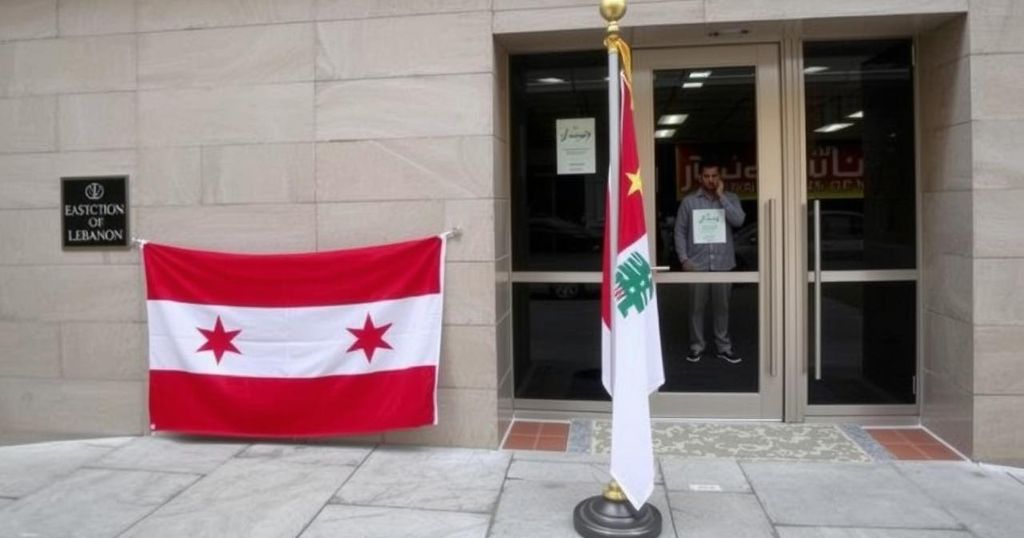Suspension of Services at Syrian Embassy in Lebanon Amid Political Shifts

Syria’s embassy in Lebanon has suspended consular services following the arrest of relatives of deposed President Bashar Assad due to allegations of forged documents. Parallely, Lebanese authorities transferred dozens of Syrians, including former army officers, to the new regime led by Hayat Tahrir al-Sham, which has intensified its operations against pro-Assad factions while grappling with internal dissent regarding women’s rights under its governance.
On Saturday, Syria’s embassy in Lebanon announced the suspension of consular services, coinciding with the transfer of several Syrians, including former officers of the deposed regime, to the current Syrian authorities. This suspension followed the detention at Beirut airport of two relatives of former President Bashar Assad, who possessed allegedly forged passports. The Lebanese security forces handed over approximately 70 individuals who were apprehended for illegally entering Lebanon to the new regime, which is led by the former insurgent group, Hayat Tahrir al-Sham (HTS).
The embassy’s declaration did not specify a reason for the service suspension, which was ordered by the Syrian foreign ministry. Lebanese officials indicated that the forged passports reportedly originated from the embassy itself, thereby contributing to the suspension. Notably, Rifaat Assad, the uncle of the former president and facing war crimes charges in Switzerland, traveled out of the country previously without incident.
Regional nations are swiftly establishing relations with Syria’s new governance. Recent visits from Libyan and Bahraini officials to Damascus indicate a growing acceptance of the HTS-led authorities. The HTS has worked to mitigate concerns regarding its governance approach, assuring external and internal stakeholders of a less punitive stance towards communities previously loyal to Assad. However, tensions persist, particularly as HTS continues to conduct raids on pro-Assad officials and establish checkpoints within Alawite-dominant areas.
Moreover, sporadic violence has been noted between HTS forces and pro-Assad factions, as well as conflicts in northeastern Syria involving Kurdish forces and Turkey-backed militias. The U.S. State Department continues to monitor these developments, wherein Secretary of State Antony Blinken reiterated to Turkish officials the importance of fostering a Syrian-led political process that emphasizes human rights and inclusivity.
Accounts from Kurdish women’s groups in Hasaka revealed discontent with the new regime, alarming fears about the apparent rise of Islamist leadership that may undermine women’s rights. Participants voiced concerns that the new leadership might be more restrictive than the Assad regime, calling for women’s representation in forthcoming political frameworks. “Women must be present in the new constitution for Syria,” stated Rihan Loqo from the Kongra Star organization, underscoring the necessity of safeguarding women’s rights in the evolving political landscape.
The situation remains volatile as the new Syrian authorities seek to navigate the complex dynamics involving various factions and demographics within the country, particularly regarding the future of civil rights and governance.
The backdrop of this development stems from ongoing shifts in Syria’s political landscape following the civil war that displaced millions and fragmented its governance. The new power dynamics are influenced by regional relationships and the previous regime’s enduring impact on the Syrian populace. The HTS, a former insurgent group, has established control over key areas, complicating Syria’s path toward stability and governance amidst a multitude of local and regional interests. This development’s implications extend deeply into societal norms, human rights, and the balance of power within Syria.
In summary, the suspension of Syria’s embassy services in Lebanon and the transfer of former Syrian officers highlight the continuing turmoil in the aftermath of President Bashar Assad’s regime. With HTS now in control, the regional response indicates a readiness to engage with the new authorities, albeit amid a climate of tension and uncertainty regarding civil rights. As various factions jockey for influence, the future of governance, women’s rights, and regional stability in Syria remains precariously balanced.
Original Source: www.newsday.com








